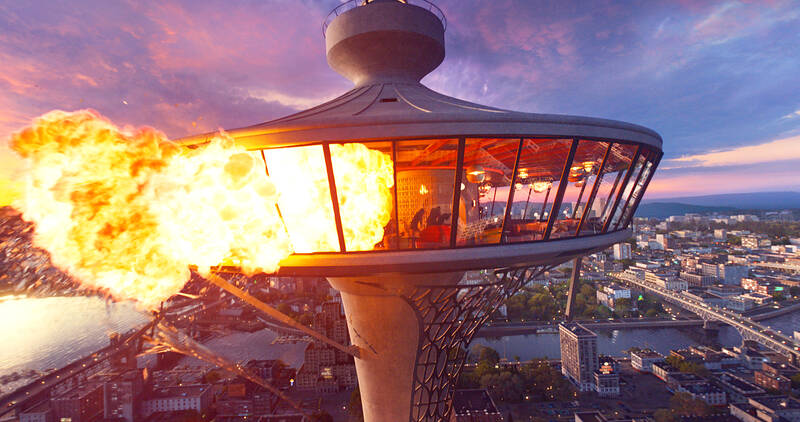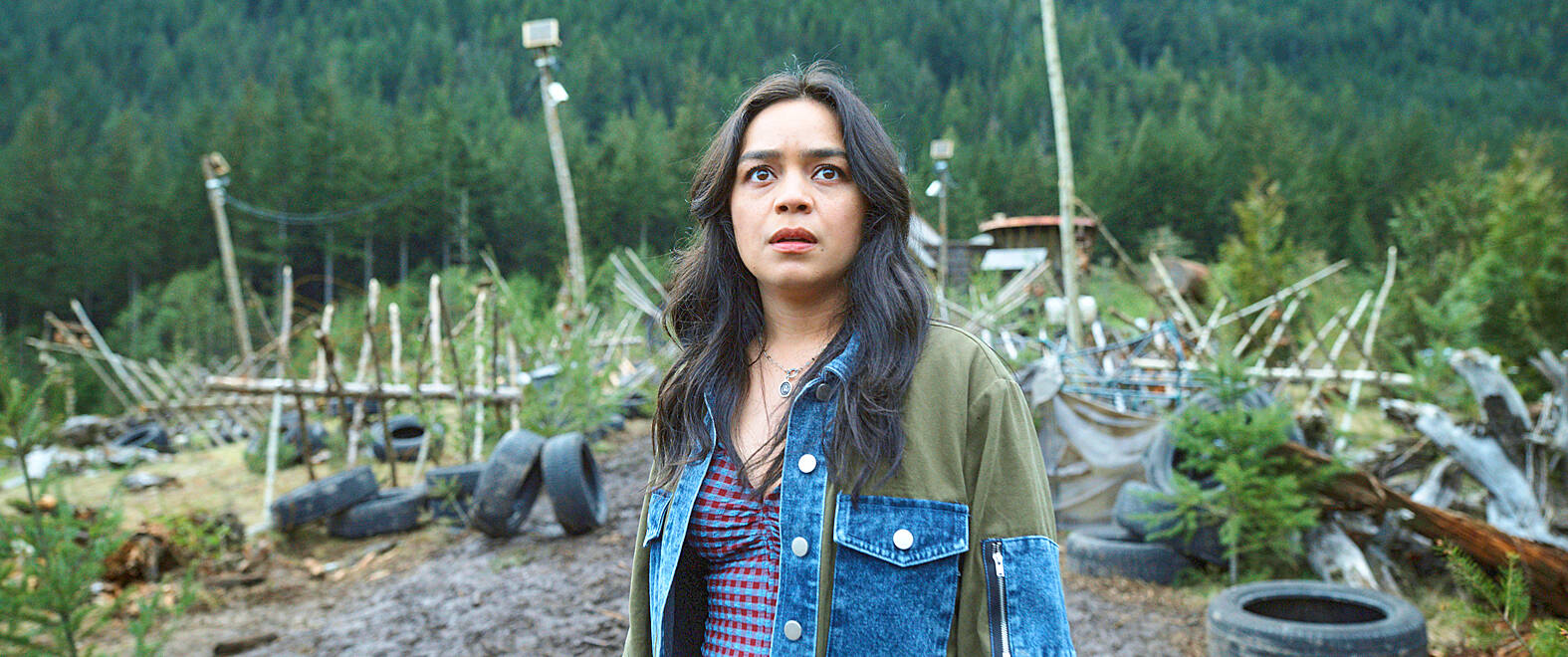A blender. A lawn mower. A ceiling fan. A garden rake. A vending machine. An MRI scanner.
These mundane items are supposed to ease us through life, helping us eat, clean, keep cool, stay healthy. They’re not supposed to be evil.
But in Final Destination Bloodlines, as in the entire 25-year franchise, ordinary objects become fearsome tools of murderous mayhem. And they do it through intricate sequences akin to Rube Goldberg machines — those contraptions that make simple tasks complex through elaborate chain reactions. We doubt Goldberg intended for a nose ring to interact with a ceiling fan in quite the way seen here, but whatever.

Photo: AP
There’s some ingenious chaos cooked up here by co-directors Zach Lipovsky and Adam B. Stein, who said at the film’s premiere this week that they hope people will be watching this, the franchise’s sixth installment (and 14 years after the last), through their fingers — but with smiles on their faces.
To which I must confess I muttered to myself: “No way I’m going to be smiling.” I braced to feel jumpy and miserable for two hours.
But sure enough I was soon smiling, even giggling. Turns out, horror films are a lot easier to handle when they’re funny. Even more so when they’re witty. A spoonful of wit, as Mary Poppins might say, helps the bloody mayhem go down.

Photo: AP
Part of the fun in these movies is that we all know what we know. The surprise is not whether people will die. Death is not to be cheated. The issue is HOW, and that’s where creativity comes in.
The action starts with probably the most impressive sequence in the movie — an opening scene set in 1969 at the so-called Skyview tower, looking very much like the Space Needle (but filmed in Vancouver). It’s opening night at the luxurious restaurant up top.
Lovely young Iris (Brec Bassinger) is brought here by her beau for a romantic evening and, though she doesn’t know it, a proposal. In the elevator, Iris tries to calm her nerves. It doesn’t help when the elevator guy boasts the project was completed months ahead of schedule.

Photo: AP
Once upstairs, Iris’ nerves persist, but she tries to quell them. When she nicks her finger and a bit of blood seeps out, she says with a smile, “I’ll live.”
Ha!
Soon enough, rivets are popping and the place is crumbling. Then people start dropping dead on the ground, to the befuddlement of parking valets listening to Raindrops Keep Fallin’ On My Head — written in 1969! — one of many musical jokes here.
And then a present-day college student wakes up.
Turns out this has all been a recurring nightmare of Stefani, who’s in danger of flunking out because all she can think of is Skyview. Her sleep-deprived roommate urges her to go home and figure things out.
Which Stefani (an appealing Kaitlyn Santa Juana) does, determined to learn who Iris is. Turns out the woman is her grandmother. Uncle Howard tells her to stay away from the madwoman who years ago lost custody of her children.
Stefani suspects there’s more to it. She tracks Iris down in the remote cabin where the reclusive woman has spent decades. She learns that Iris indeed survived a Skyview calamity — but thanks to her premonition, she actually saved many lives.
There’s a catch, though. Every person who survived — thanks to Iris — ended up dying later. That’s because they cheated Death, and became marked men and women. Their offspring are marked too — hence the movie’s title — because they were never supposed to exist. “Death is coming for our family,” Iris warns.
What does this mean for Stefani? It means she has to save everyone. And that everyday life becomes very dangerous.
A family barbecue starts off happily, but then we see the spiked rake lodged just under the trampoline, and the huge glass shard in the blender. Someone will die. But who, and how?
And that’s how the movie continues, upping the ante with each kill. A tattoo parlor hosts one of the more creative Goldberg-ian catastrophes. Even wilder is a scene with an MRI scanner. You know that giant magnet? Yeah, that.
Just as important are the non-deaths — the times you’re sure something terrible will happen, but it doesn’t. I found this silly phrase scrawled later on my notepad: “Actually he doesn’t die.”
Some people hate horror films of any kind. They’re not the intended audience here. But for those who don’t, or are mixed, it’s true: You may watch Final Destination Bloodlines through fingers covering your face. But chances are high you’ll be smiling, too.

The Lee (李) family migrated to Taiwan in trickles many decades ago. Born in Myanmar, they are ethnically Chinese and their first language is Yunnanese, from China’s Yunnan Province. Today, they run a cozy little restaurant in Taipei’s student stomping ground, near National Taiwan University (NTU), serving up a daily pre-selected menu that pays homage to their blended Yunnan-Burmese heritage, where lemongrass and curry leaves sit beside century egg and pickled woodear mushrooms. Wu Yun (巫雲) is more akin to a family home that has set up tables and chairs and welcomed strangers to cozy up and share a meal

Dec. 8 to Dec. 14 Chang-Lee Te-ho (張李德和) had her father’s words etched into stone as her personal motto: “Even as a woman, you should master at least one art.” She went on to excel in seven — classical poetry, lyrical poetry, calligraphy, painting, music, chess and embroidery — and was also a respected educator, charity organizer and provincial assemblywoman. Among her many monikers was “Poetry Mother” (詩媽). While her father Lee Chao-yuan’s (李昭元) phrasing reflected the social norms of the 1890s, it was relatively progressive for the time. He personally taught Chang-Lee the Chinese classics until she entered public

Last week writer Wei Lingling (魏玲靈) unloaded a remarkably conventional pro-China column in the Wall Street Journal (“From Bush’s Rebuke to Trump’s Whisper: Navigating a Geopolitical Flashpoint,” Dec 2, 2025). Wei alleged that in a phone call, US President Donald Trump advised Japanese Prime Minister Sanae Takaichi not to provoke the People’s Republic of China (PRC) over Taiwan. Wei’s claim was categorically denied by Japanese government sources. Trump’s call to Takaichi, Wei said, was just like the moment in 2003 when former US president George Bush stood next to former Chinese premier Wen Jia-bao (溫家寶) and criticized former president Chen

President William Lai (賴清德) has proposed a NT$1.25 trillion (US$40 billion) special eight-year budget that intends to bolster Taiwan’s national defense, with a “T-Dome” plan to create “an unassailable Taiwan, safeguarded by innovation and technology” as its centerpiece. This is an interesting test for the Chinese Nationalist Party (KMT), and how they handle it will likely provide some answers as to where the party currently stands. Naturally, the Lai administration and his Democratic Progressive Party (DPP) are for it, as are the Americans. The Chinese Communist Party (CCP) is not. The interests and agendas of those three are clear, but